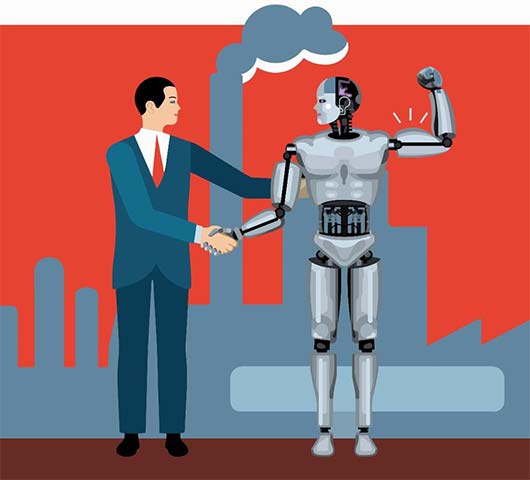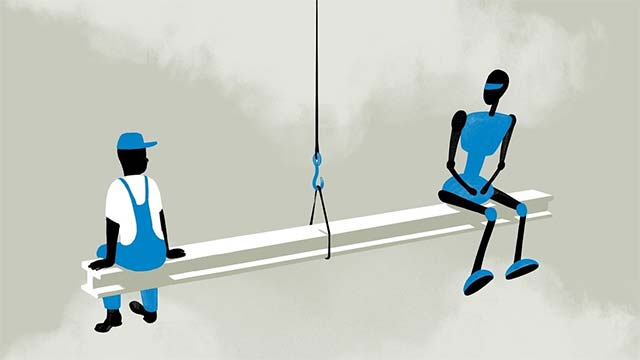Bad news for journalists: Robots are increasingly able to 'snatch' better
Newspapers, in general, have never been a simple field. In order to produce an article, the author has to spend hours studying, analyzing information and interpreting it so that it is smooth and coherent through each word. But the difficulty does not stop there, the writer must know how to set the title so that his work will be more positively received by readers, while still ensuring honesty - a category of about professional ethics.
Previously, many journalists voiced their mockery of the idea of an AI system capable of doing their job, which could even outperform them. But looking at the current development of artificial intelligence technology, journalists should probably start to worry about their careers. AI models can now gather information about events, then analyze, synthesize and write short, simple reports, and in particular it can 'publish articles with frequency. dizziness' - the level of productivity that flesh skin pens can never achieve. However, the biggest weakness for AI models in today's newspapers is that creativity is not high. In fact, the 'AI journalists' have completely failed to compose human-centered articles, prose type requires high creativity as well as how to use flexible and flexible language. transfer, can make readers attracted from beginning to end.

- Artificial intelligence was able to write an article just from some information
But this will change soon.
Primer, a well-known AI company, has recently developed a tool capable of writing headlines for short articles, brief news that looks pretty much like being written by professional writers, working for major newspapers. These 'works' are not 100% perfect, but in general the examples they offer are usually quite good, in line with the overall content of the article.

- IBM researchers analyzed breast cancer cell structure with AI
Kaveh Waddell, an expert from technology news site Axios, is responsible for overseeing the works of the Primer robot. Mr. Kaveh Waddell asked Primer for robots to create new articles based on data given in the past. The titles it chooses all come from previous Axios articles, except for the last part, which Waddell wrote for The Atlantic, including:
- Uncovering secret government AI (Link refer to: www.axios.com/ai-surveillance-facial-recognition-secret-705b746b-43fa-4e1b-9866-96ef9c32d580.html).
- The AI acquisitions war (Link reference: www.axios.com/ai-acquisitions-war-79ee3c6a-dcab-40d2-b574-0d2646fe4a46.html
- The AI sharecroppers (Link reference: www.axios.com/the-ai-sharecroppers-b316d333-ce00-47a1-afd5-219d6138461e.html)
- The desperate search for Lebanon's mass graves (Reference link: www.theatlantic.com/international/archive/2018/04/lebanon-civil-war-burial-missing/558632/)
From the data sources are the above articles, the Primer AI model has produced some of its own 'writing' ideas. The results show that the first two titles AI offers are not very good. However, for the last two cases, this AI model has shown excellent excellence, it has created headlines that most editors will not hesitate to publish immediately.
- AI and surveillance
- AI companies since 2010, carving out another front in the nonstop war
- The new 'sharecroppers'
- Thiếu sự xác định của Beirut
According to the evaluation of Kaveh Waddell, the first title was quite boring, with no accents and absolutely unreliable. This title is not so bad, but according to Waddell, most young writers are able to get a much better title with such content. For experienced authors, they can even give a much better title with just a fleeting thought!
The second case completely slipped out of focus as well as the purpose of the title. It is long, confusing, and of course not attractive at all. 
- The difference between AI (Artificial Intelligence) and Cognitive Computing (Cognitive Computing)
However, in the last 2 cases, it is fair to say that Prime's AI model has really done very well, not inferior to professional pens. In an online industry 'journalism' that is fiercely competitive today, headlines are a particularly important factor - it must be attractive enough to entice a click from readers, but at the same time, to ensure the authenticity, not to be far from the content of the work, nor to mislead 'dangerous' for those who only like 'reading title'. Surprisingly, robots can create but the title is so standard.
In order to train the AI model to create a title, Primer had to use more than a million different titles and news. Thus, the model can learn how to set up and sequence the best possible word strings, based on previous training data. Next, experts will evaluate the AI-generated examples compared to the original (written by humans) in a test called 'headline Turing test'. The current success that Primer has achieved with its AI model is remarkable.

- How did AI affect daily life?
Until now, understanding and creating language so coherently, naturally, and human-centered is still one of the most difficult tasks for AI. By then journalists (including me) could breathe a sigh of relief because perhaps they had not been robbed of the job in the near future. However, the gap in writing skills between AI and people is getting smaller and faster than ever. After all, maybe we should learn how to write code, instead of writing it as it is today.
You should read it
- ★ Artificial intelligence learns to create another artificial intelligence, replacing people in the future
- ★ 6 steps to start learning artificial intelligence programming (AI)
- ★ What happens if aliens are artificial intelligence?
- ★ [Infographic] Benefits and hazards from Artificial Intelligence
- ★ Nvidia successfully developed an AI system that can create 3D models from 2D images